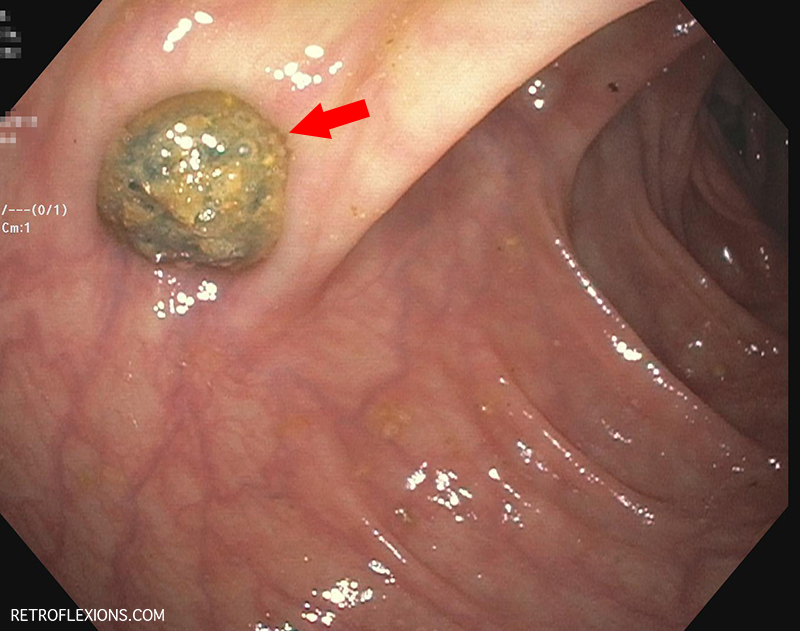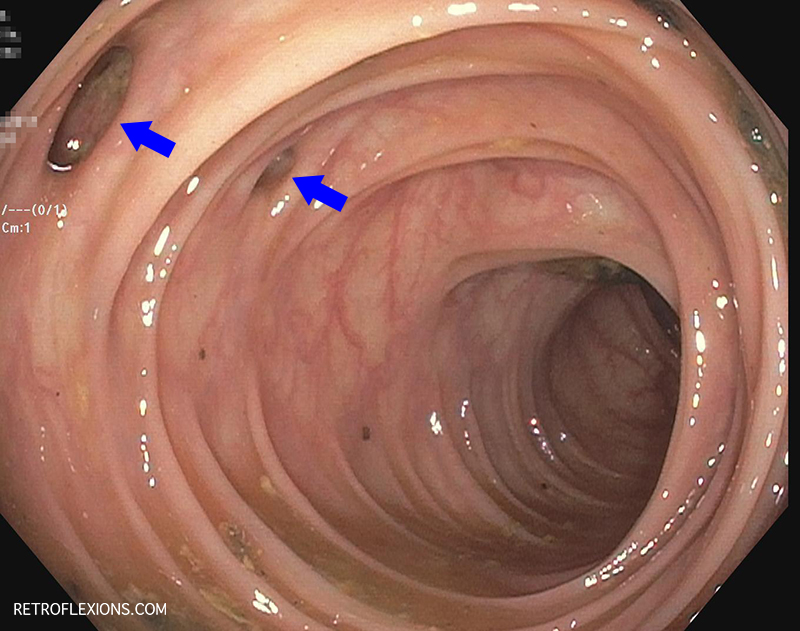Diverticulitis is a common and sometimes serious problem that affects several hundred thousand people each year. Diverticulitis is the condition where small outpouchings or “pockets” in the wall of the large intestine called diverticula become inflamed and infected, and typically presents as a constant lower abdominal pain, associated with fever or chills, and often bloating or constipation symptoms. Despite becoming even more common in recent years, not much is understood about why diverticulitis occurs.
Diet has long been implicated in the formation of these diverticula which can eventually become inflamed leading to diverticulitis (the condition of just having the pockets without an associated infection/inflammation is called diverticulosis). We know that diverticular disease is rare in countries where fiber intake is high, and we know that when populations change to a more westernized diet (poor in fiber/rich in protein, fat and processed sugars) the rate of diverticular disease rises accordingly. So if fiber is protective against developing diverticular disease in the first place, does it stand to reason that supplementing fiber when one already has diverticulosis will help prevent future complications?
The answer to the above question is unknown, but because fiber is a mostly harmless supplement and has other health benefits, we often recommend fiber supplementation to patients after they are diagnosed with diverticulosis or diverticulitis. But what about the common advice of avoiding seeds, nuts, corn, and popcorn that is readily doled out by some doctors and most family members/friends as soon as they hear the words diverticulosis or diverticulitis? One can reason that it makes common sense to try to avoid having sharp, hard, indigestible seeds getting stuck in a diverticulum and causing an abrasion or perforation which may lead to infection and other nastiness. But does this recommendation have any valid scientific reasoning behind it?
While I’m not sure when or where this recommendation started, it probably belongs more under the category of “old wives’ tale” rather than scientific fact. Let me explain my reasoning for this:
It is very commonly observed during colonoscopy that patients with diverticulosis are found to have a small ball of stool impacted in each and every diverticulum. Presumably, this is the natural state of affairs in the colon of the patient with diverticulosis. So if small hard pellets of stool (mostly composed of indigestible waste and bacterial mass) do not cause an infection, why would a small seed or nut cause a problem? Nevertheless, people still take great pains to avoid seeds, nuts, and corn, causing themselves a fair amount of grief when it comes to meal options. Is this all worth it?
I would reason that it is not necessary to avoid seed and nuts if you have diverticular disease. Probably the best evidence we have that seeds, nuts, corn, and popcorn do not cause complications in patients with diverticular disease comes from a study published in JAMA in 2008 showing that not only was intake of nuts, seeds, popcorn, and corn NOT associated with developing diverticulitis, but in fact the opposite was true. Eating more seeds, nuts, corn, and popcorn actually seemed to be associated with LESS of a chance of developing diverticulitis! These foods are thought to be somewhat anti-inflammatory, and therefore may protect against diverticulitis.
So what is the ideal diet to prevent development of diverticular disease? I think it is pretty obvious that a high-fiber diet is king in preventing the development of diverticulosis. But what if you are late to the high-fiber party but still want to make some changes to prevent that next attack of diverticulitis? Starting a high-fiber diet later in life may still help to reduce the progression of more diverticula, but unfortunately there is no way to reverse the existing diverticula (besides surgical resection of the diseased segment of colon). However, there are still diet changes you can make that might help.
It seems that diets high in red meat are also associated with the development of diverticulitis. This is independent of the effect of fiber, as red-meat eaters develop diverticulitis more often than their vegetarian counterparts even after controlling for fiber intake between the groups. What is more interesting is that researchers found that the recent diet for the past 1-4 years before developing diverticulitis seemed to shape the risk more than the lifelong diet habits. That means that changing to a high-fiber, low-red-meat diet now can still lessen your chance of developing diverticulitis in the near future. But look at the bright side–at least you can eat all the seeds, nuts, corn, and popcorn you want!



Joan Zaleha
May 10, 2019 at 11:45 PM
I’m confused. Is it worth the risk of eating nuts & popcorn that might irritate diverticulosis or is it actually safe to have a handful here & there?
Frederick Gandolfo, MD
May 11, 2019 at 8:09 AM
Don’t be confused…eat all the seeds and nuts you want!
Deb
October 9, 2019 at 8:08 PM
I will tell you this….i ate a a lot of popcorn one night and the next couple of days i was in pain. I take benefiber daily EVERY day and the one time i ran out of benefiber and missed taking for two days is when i had a BAD flare up…I say get used to doing fiber shots (thats what I call them…lol) prior to each meal. Put some Benefiber in about 1 tsp in a small glass of water and drink..it truly makes a difference since the fiber will help cushion foods and make food digest better. Go even one step further and take probiotics with your prebiotic fiber. Good luck and take care of yourself!! I was in the hospital for a week and learned my lessons. FIBER is a must….EVERYDAY!!! and avoid seeds nuts and popcorn if you can…if yiu must eat them….suck down the fiber beforehand…d
Laurel
July 7, 2019 at 1:10 PM
I’m also confused. My older sister has been a VEGAN for the last 8 years and only developed diverticulitis a couple of years ago. So, no animal products of any kind, whatsoever. She won’t even get a flu shot!
However, she has had at least two acute attacks. (and probably some lesser ones) The first time was after eating popcorn. This last time was worse; it was after eating nuts and she ended up in the ER. She has been taking antibiotics and is going to have a colonoscopy. She did have a recent CT scan which also revealed some hernias. I realize that you cannot diagnose her issues, however, she has been ordered by her physicians to stay away from seeds and nuts.
Our mother also had diverticulitis and ended up in the hospital on morphine after eating seeds and nuts. If she stayed away from those foods, she has had no issues whatsoever– for at least 20 years. She is winding down now in a nursing home and has been eating a pureed vegetarian diet for the last five years.
The point is; both have had issues with seeds and nuts on more than one occasion, followed by a subsequent excruciatingly painful flare up. When they stay away from those foods, they are fine. Therefore, my logic tells me that eating seeds and nuts, for whatever the reason, might not be advisable for people who are prone to diverticulitis.
In addition, the prevailing advice given by other gastroenterologists is to stay away from seeds and nuts. And, while your recommendations sound appealing to us popcorn and nut lovers, I am concerned that it is not accurate and potentially harmful advice. I look forward to hearing your kind reply. Thank you.
Frederick Gandolfo, MD
July 10, 2019 at 8:42 PM
I understand your concern, but published evidence supports what I stated in my article. Of course, there are always the exceptions to the rule, but for the majority of people with diverticular disease, seeds, nuts, and popcorn are safe. Many gastroenterologists and other physicians still give the outdated advice about avoiding seeds/nuts etc, but that doesn’t change the facts!
Debra Teich
August 1, 2019 at 4:48 PM
is a keto diet okay to be on with diverticular disease?
Barbara Grzruel
September 2, 2019 at 6:12 PM
Ii have diverticulosis and have had 2 significant diverticulitis attacks, one with infection, one without. My doctors recently corrected their dietary instruction and said it’s okay to eat seeds & nuts. Because both times my attacks were preceded by nuts (over a period of a week or so) I do not eat them. I think you have to use common sense as to what bothers your body–not everyone is the same. I do not eat nuts, seeds, or popcorn anymore by choice. It’s more important to eliminate the chances of another attack than to partake in those foods.